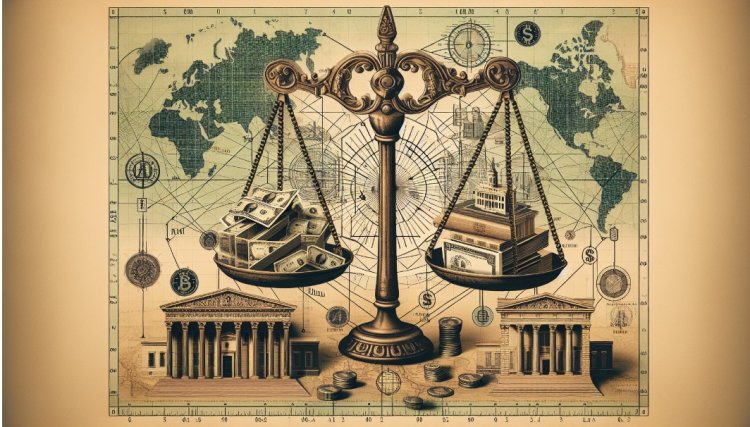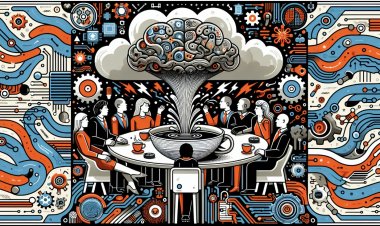Occult World of Business and Finance, Chapter 2
Explore the 'Occult World of Business and Finance' and its hidden depths. This enlightening investigation reveals the lesser-known ties between the financial industry and the occult, demonstrating how mystical and esoteric activities impact contemporary business and economic tactics.

Understanding the World of Admiralty and the Legal System
In the world of research and knowledge, few individuals have had as much influence as Jordan Maxwell. I first came across his work about three and a half years ago when my girlfriend insisted that I listen to him on a late-night radio show. Little did I know that this encounter would change my life forever.
Jordan's ability to present powerful information about various topics, such as religion, banking, politics, and UFOs, in a way that was both eye-opening and thought-provoking, left me absolutely blown away. I was so captivated by his ideas that I immediately grabbed a notebook and started taking notes.
It is important to acknowledge the significant role that Jordan Maxwell plays in the research community. His work has served as an inspiration to and a guide for many researchers, including myself. His unique perspective and deep understanding of various subjects have allowed us to delve into new realms of knowledge and expand our understanding of the world.
One of the key areas that Jordan emphasizes is the importance of understanding the law. He has shed light on the concept of admiralty law and its influence on our legal system. By explaining the distinction between civil law and the law of water and money, he has revealed how our current legal system is based on commerce rather than solely on law.
The concept of admiralty
The philosophy and concept of admiralty law are crucial to understanding the legal system. Admiralty law refers to the distinction between civil law and the law of water and money. In our current legal system, commerce plays a significant role, often superseding the principles of law.
Admiralty law focuses on the manipulation of people through legal systems by the banking system. The banking system, controlled by the "banksters," has created a complex web of laws and regulations that serve to extract money from individuals. This artificial construct has been superimposed over the common law system, making it essential for individuals to understand the distinction between the two and how it affects their everyday lives.
The importance of understanding admiralty law lies in its influence on our legal system. Many people are unaware of the extent to which the legal system is based on commerce rather than the principles of justice and fairness. By understanding the artificial construct, individuals can begin to navigate the legal system more effectively and protect their rights.
Civil Law vs. the Law of Water and Money
Civil law refers to the collective agreement of a group of people to follow certain behavioral patterns. It is the foundation of our common law system. However, the law of water and money, which is at the core of admiralty law, supersedes civil law in many cases. This means that the legal system is primarily concerned with commercial transactions and the extraction of money.
Manipulation by the Banking System
The banking system manipulates people through the legal system by creating laws that benefit their interests. The laws are designed to ensure a constant flow of money from individuals to the banks, further consolidating their power and control over the economy. By understanding this manipulation, individuals can make informed decisions and protect themselves from being exploited.
Understanding the Artificial Construct
The artificial construct of admiralty law is a system of rules and regulations that have been imposed over the common law. Individuals must understand this construct to navigate the legal system effectively. By understanding the distinction between common law and the artificial construct, individuals can assert their rights and protect themselves from unjust actions.
Common Law vs. Let's Pretend Game
In the world of law, there are two main systems: common law and the let's pretend game. Common law refers to the collective agreement of a group of people to follow certain behavioral patterns. It is the foundation of our legal system and emphasizes justice and fairness. Common law is crucial for individuals to access and use to their advantage.
However, there is a lack of understanding and ignorance about the law among many people. Many individuals are not aware of the distinction between common law and the let's pretend game. They participate in a consensus reality where they believe they have to follow certain rules and regulations without questioning them. This lack of understanding can have serious implications for individuals' rights and freedoms.
Participating in the consensus reality of the let's pretend game means accepting the rules and regulations imposed by the banking system and the legal system based on commerce. It means giving away one's power and control over their own lives. By participating in this game, individuals unknowingly become part of a system that benefits the interests of the banking system and the "banksters."
Individuals need to access and use common law to their advantage. By understanding the artificial construct of the let's pretend game and its implications, individuals can assert their rights and protect themselves from unjust actions. Accessing common law allows individuals to navigate the legal system more effectively and make informed decisions. It enables people to take charge of their own lives and resist manipulation by the banking system.
Understanding Certificates and Paperwork
Certificates and paperwork play a significant role in our society, often serving as proof or documentation of important events or qualifications. Understanding the significance of certificates and paperwork can help individuals navigate various systems and protect their rights. Here are some key points to consider:
Explanation of Certificates and Their Significance
Certificates are official documents that verify the truth of certain facts or details. They serve as evidence or proof of something, providing legitimacy and credibility. Certificates can cover a wide range of areas, including birth, marriage, education, and professional qualifications. Typically, authorized institutions or authorities like governmental organizations, educational institutions, or professional associations issue them.
Role of Birth Certificates and Human Resources
Birth certificates are one of the most common types of certificates. They serve as legal proof of a person's birth and identity. Birth certificates are vital documents, as they are required for various purposes, such as obtaining a passport, enrolling in schools, applying for government benefits, and establishing citizenship. In the context of human resources, employers frequently use birth certificates to confirm an employee's age and eligibility for employment.
The Shift Towards a System of Certification
In recent years, there has been a shift towards a system of certification in many industries and professions. Certification is a process by which individuals can obtain official recognition of their skills, knowledge, or qualifications in a specific field. It often involves completing a standardized assessment or meeting certain criteria set by a governing body or organization. Certification can enhance job prospects, demonstrate competency, and provide opportunities for professional development and advancement.
The Connection Between Certificates and Money
Certificates and paperwork are closely tied to the concept of money. In many cases, certificates, such as educational degrees or professional licenses, can increase earning potential and open up opportunities for higher-paying jobs. Additionally, certain certificates, such as stock certificates or bonds, represent ownership or investment in a company or organization and can have a monetary value. The connection between certificates and money highlights the importance of obtaining and maintaining accurate and legitimate documentation.
The Legal Definition of Person
In the legal world, the definition of a person is different from what we might commonly understand. According to the law, a person can refer to various entities, including natural persons and juristic persons.
A natural person is what we typically think of as a person—an individual human being. They have inherent rights and responsibilities and can be held accountable for their actions. On the other hand, a juristic person refers to an artificial entity, such as a corporation, partnership, or limited liability company. Juristic persons also have legal rights and responsibilities but are separate from the individuals who make up the entity.
The distinction between natural persons and juristic persons is important because it affects issues such as liability and responsibility. Natural persons can be held personally liable for their actions, while juristic persons can provide limited liability for their members or owners. This means that the individuals involved in the entity are protected from personal liability for the entity's debts or obligations.
However, this limited liability can also lead to a lack of responsibility. Juristic persons are considered legal fiction; they exist only on paper and have no inherent consciousness or moral agency. This means that they cannot feel emotions, have beliefs, or make decisions in the same way that natural persons can. They can be used as tools for various purposes, such as conducting business or owning property, but they do not have the same inherent rights and responsibilities as natural persons.
The implications of being considered a work of fiction are significant. It means that juristic persons cannot be held accountable in the same way that natural persons can. They cannot be imprisoned or experience physical or emotional harm. However, they can still face legal consequences, such as fines or sanctions, and can be dissolved or face other legal remedies if they violate the law.
Understanding the legal definition of a person is crucial for navigating the legal system. It helps individuals understand the distinction between natural persons and juristic persons, the implications of limited liability, and the concept of being considered a fiction. By having this knowledge, individuals can better protect their rights and make informed decisions when dealing with legal matters.
Real World vs. Legal World
In comparing the physical world to the legal world, several key differences must be understood. These differences highlight the distinction between substance and reflection, as well as the implications of being considered a paper certificate.
Comparison between the Physical and Legal Realms
The physical realm refers to the tangible world we live in, where actions have real consequences and individuals are held accountable for their behaviors. It is a realm governed by natural law and principles of justice and fairness. In contrast, the legal realm is a construct based on commerce, where the flow of money takes precedence over the principles of law. It is a system created by the banking system to extract wealth and power from individuals.
Difference between Substance and Reflection
In the real world, substance refers to the actual essence of something, while reflection refers to a mere representation or symbol. In the legal world, individuals are considered paper certificates, artificial entities created by the system. They are not seen as real beings with inherent rights and responsibilities, but rather as fictions that exist only on paper. This distinction has significant implications for how individuals are treated and held accountable within the legal system.
Exploration of the Real Essence and the Thing Named
Understanding the difference between the real essence and the thing named is crucial for navigating the legal system. In the real world, individuals have inherent rights and responsibilities, and their actions have real consequences. In the legal world, individuals are reduced to mere names on pieces of paper, and their rights and responsibilities are determined by the artificial construct of the system. It is important to recognize the limitations of this construct, assert one's rights, and protect oneself from unjust actions.
Implications of Being Considered a Paper Certificate
Being considered a paper certificate has significant implications for how individuals are treated within the legal system. It means that individuals are not seen as real beings with consciousness, emotions, and moral agency but rather as tools for various purposes, such as conducting business or owning property. While this may provide limited liability and protection from personal responsibility, it also means that individuals cannot be held accountable in the same way as natural persons. It is important for individuals to understand this distinction and to navigate the legal system effectively to protect their rights and make informed decisions.
The Role of Courthouses
Courthouses serve a crucial purpose in the legal system, acting as primary facilities where legal proceedings take place. They are the physical locations where individuals go to resolve disputes, seek justice, and protect their rights. In this section, we will explore the purpose of courthouses, compare them to Masonic lodges, and examine the role of the judicial system as a banking system.
An Explanation of the Purpose of Courthouses
The purpose of courthouses is to provide a venue for legal proceedings to take place. They are where judges, lawyers, and other legal professionals come together to hear cases, present evidence, and make decisions. Courthouses ensure that the legal system operates in a fair and orderly manner, upholding the principles of justice and due process.
Comparison between Courthouses and Masonic Lodges
Courthouses and Masonic lodges may seem unrelated, but they share some similarities. Both are physical locations where individuals gather for a specific purpose. While courthouses focus on legal proceedings, Masonic lodges serve as meeting places for Freemasons, a fraternal organization. Both institutions play important roles in their respective communities, providing spaces for individuals to come together and engage in structured activities.
Exploration of the Judicial System as a Banking System
One unique aspect of the judicial system is its connection to the banking system. The legal system is often based on commerce, with a focus on financial transactions and the extraction of money. Banks and financial institutions have a significant influence on the laws and regulations that govern the legal system. Understanding this connection is important for individuals navigating the legal system, as it highlights the importance of financial considerations in legal proceedings.
The Extraction of Sweat Equity Through Court Proceedings
Another role of courthouses is the extraction of sweat equity through court proceedings. Sweat equity refers to the value individuals contribute through their hard work, skills, and effort. In legal proceedings, individuals may be required to spend time, money, and energy to resolve disputes or seek justice. Court proceedings can involve fees, fines, and legal expenses, which can extract the sweat equity of individuals involved in the case. Understanding this aspect of court proceedings is crucial for individuals to protect their rights and make informed decisions.
The role of attorneys
Attorneys play a dual role in the legal system, with obligations to both the courts and their clients. In the Let's pretend game, attorneys are crucial in representing the artificial legal fictions that exist within the system. They navigate the legal system on behalf of their clients, ensuring that their rights are protected and their interests are represented.
Attorneys are essential in the let's pretend game because they understand the intricacies of the legal system. They are well-versed in the laws and regulations that govern commerce and can effectively advocate for their clients in court. They have the knowledge and expertise to navigate complex legal processes and procedures, ensuring that their clients receive fair treatment and a proper defense.
Attorneys often represent artificial legal fictions, such as corporations, partnerships, or limited liability companies. These entities have legal rights and responsibilities, but they do not possess the same inherent consciousness or moral agency as natural persons. Attorneys act as advocates for these entities, protecting their interests and ensuring that they are treated fairly under the law.
It is important to recognize that the majority of court cases have a commercial nature. The legal system is based on commerce, and many laws and regulations are designed to protect the interests of the banking system and financial institutions. Attorneys play a crucial role in these cases, representing their client's financial interests and ensuring that they are not exploited or taken advantage of.
Conclusion
In conclusion, it is important to recap the key points discussed in this blog. We have explored the world of admiralty and the legal system, thanks to the contributions of Jordan Maxwell. We have learned about the concept of admiralty law and its influence on our legal system, as well as the distinction between civil law and the law of water and money. Understanding this distinction is crucial for navigating the legal system effectively and protecting our rights.
We have also delved into the significance of understanding certificates and paperwork, as they play a vital role in various aspects of our lives, such as birth certificates, educational degrees, and professional licenses. These documents serve as evidence or proof of certain facts or qualifications, and understanding their significance can help us navigate different systems and protect our rights.
Additionally, we have explored the legal definition of a person and the implications of being considered a paper certificate. The distinction between natural persons and juristic persons is important in understanding liability and responsibility. By understanding this distinction, individuals can better navigate the legal system and protect their rights.
We have discussed the differences between the real world and the legal world, as well as the role of courthouses in the legal system. Courthouses serve as primary facilities where legal proceedings take place, and understanding their purpose and connection to the banking system is crucial for individuals navigating the legal system.
Lastly, we have explored the role of attorneys in the legal system. Attorneys play a dual role, with obligations to both the courts and their clients. They navigate the legal system on behalf of their clients, ensuring that their rights are protected and their interests are represented. Understanding the role of attorneys in the let's pretend game of the legal system is important for individuals seeking legal representation.
The world of admiralty and the legal system are complex and often misunderstood. However, by understanding key concepts and principles, individuals can navigate the legal system more effectively and protect their rights. Further research and exploration into these topics is encouraged, as there is always more to learn and discover. And finally, a special acknowledgment to Jordan Maxwell for his invaluable contributions to the research community and our understanding of the world.



 admin
admin 










